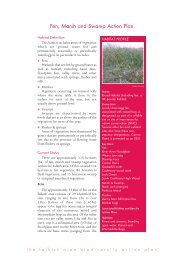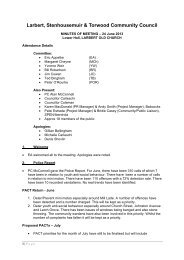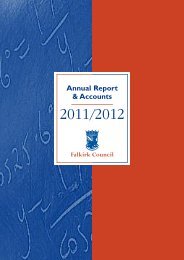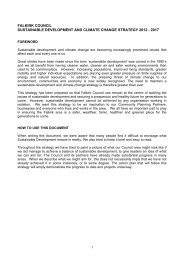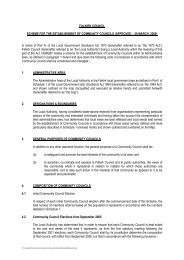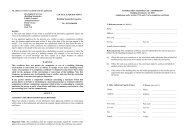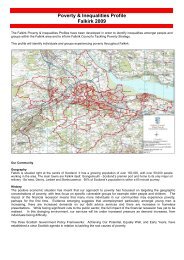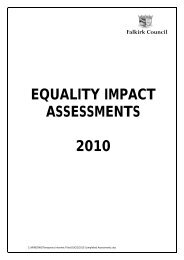FALKIRK COUNCIL Anti-fraud and Corruption Strategy
FALKIRK COUNCIL Anti-fraud and Corruption Strategy
FALKIRK COUNCIL Anti-fraud and Corruption Strategy
You also want an ePaper? Increase the reach of your titles
YUMPU automatically turns print PDFs into web optimized ePapers that Google loves.
1. Introduction <strong>and</strong> Scope<br />
p&rsept<br />
<strong>FALKIRK</strong> <strong>COUNCIL</strong><br />
<strong>Anti</strong>-<strong>fraud</strong> <strong>and</strong> <strong>Corruption</strong> <strong>Strategy</strong><br />
Falkirk Council aims to provide excellent public service <strong>and</strong> in so doing needs to ensure probity <strong>and</strong><br />
accountability in all matters. The Council is determined to protect itself <strong>and</strong> the public from <strong>fraud</strong> <strong>and</strong><br />
corruption <strong>and</strong> is committed to the rigorous maintenance of a strategy for the prevention <strong>and</strong> detection of<br />
<strong>fraud</strong> <strong>and</strong> corruption which will provide a framework for:<br />
encouraging a corporate culture that promotes <strong>fraud</strong> deterrence <strong>and</strong> prevention<br />
raising awareness of <strong>fraud</strong> <strong>and</strong> corruption<br />
performing investigations <strong>and</strong> facilitating recovery<br />
invoking disciplinary proceedings <strong>and</strong> referral to Police<br />
monitoring, publicising <strong>and</strong> updating the <strong>Strategy</strong> <strong>and</strong> its related procedures<br />
This strategy is written for the benefit of employees, Councillors <strong>and</strong> the public. Organisations <strong>and</strong><br />
businesses dealing with the Council are also expected to act with integrity.<br />
Housing <strong>and</strong> Council Tax benefits <strong>fraud</strong> is covered by a separate strategy – “Benefits Administration <strong>Anti</strong>-<br />
Fraud <strong>and</strong> Prosecution Policy”.<br />
Appendix A lists a number of related documents.<br />
2. Definitions<br />
a) Fraud is the use of deception to obtain an unjust or illegal financial advantage. It may involve the<br />
intentional distortion of financial statements <strong>and</strong> other records <strong>and</strong> the misappropriation or theft of<br />
assets. Fraud includes both dishonest acts committed by Councillors or employees of the Council <strong>and</strong><br />
acts perpetrated against the Council by third parties.<br />
b) <strong>Corruption</strong> is the unlawful offering, giving, soliciting or acceptance of an inducement or reward which<br />
could influence the actions taken by the Council, its Councillors or its employees.<br />
c) This strategy also covers the failure of Councillors, employees or third parties to disclose an interest in<br />
order to gain financial or other benefit.<br />
3. Elements of the <strong>Anti</strong>-<strong>fraud</strong> <strong>and</strong> <strong>Corruption</strong> <strong>Strategy</strong><br />
The Council’s <strong>Anti</strong>-<strong>fraud</strong> <strong>and</strong> <strong>Corruption</strong> <strong>Strategy</strong> is based on a series of comprehensive <strong>and</strong> related<br />
elements designed to deter any <strong>fraud</strong>ulent or corrupt act. These elements are:<br />
Operating Culture<br />
Deterrent <strong>and</strong> Preventative Measures<br />
Fraud Response Policy<br />
Detection <strong>and</strong> Investigation Procedures
4. Operating Culture<br />
a) Falkirk Council is committed to the seven Principles of Public Life namely objectivity, openness,<br />
leadership, accountability, honesty, selflessness <strong>and</strong> integrity. High ethical st<strong>and</strong>ards should be adhered<br />
to <strong>and</strong> be demonstrated in all the Council’s actions <strong>and</strong> decisions.<br />
b) The Council expects Councillors <strong>and</strong> employees to lead by example in ensuring opposition to <strong>fraud</strong> <strong>and</strong><br />
corruption, in ensuring adherence to rules <strong>and</strong> regulations <strong>and</strong> that all procedures <strong>and</strong> practices are<br />
beyond reproach.<br />
c) The Council requires all individuals <strong>and</strong> organisations with whom it deals in any capacity to behave<br />
toward the Council with integrity <strong>and</strong> without intent or actions involving <strong>fraud</strong> or corruption.<br />
d) Council employees <strong>and</strong> members of the public are important elements in the stance against <strong>fraud</strong> <strong>and</strong><br />
corruption <strong>and</strong> are positively encouraged to raise any concerns they may have on issues which impact on<br />
Falkirk Council activities.<br />
e) Training <strong>and</strong> guidance are vital in maintaining the effectiveness of the <strong>Anti</strong>-<strong>fraud</strong> <strong>and</strong> <strong>Corruption</strong><br />
<strong>Strategy</strong>. The Council supports induction <strong>and</strong> work related training, particularly for employees involved<br />
in internal control systems, to ensure that their responsibilities <strong>and</strong> duties are regularly highlighted <strong>and</strong><br />
reinforced <strong>and</strong> that best practice is followed across all Council Services.<br />
f) Internal Audit’s plans are required to provide adequate coverage of the risk of <strong>fraud</strong> <strong>and</strong> corruption <strong>and</strong><br />
also to reflect the requirement for audit staff to be properly <strong>and</strong> regularly trained.<br />
g) Where appropriate, Falkirk Council will co-operate with other local authorities <strong>and</strong> public sector bodies<br />
in the prevention, detection <strong>and</strong> investigation of <strong>fraud</strong> <strong>and</strong> corruption.<br />
5. Deterrent <strong>and</strong> Preventative Measures<br />
General<br />
a) Falkirk Council’s St<strong>and</strong>ing Orders Relating to Meetings, Scheme of Delegation, Contract St<strong>and</strong>ing<br />
Orders, Financial Regulations <strong>and</strong> Code of Conduct for Members <strong>and</strong> Officers set out a framework for<br />
dealing with the affairs of the Council <strong>and</strong> all Councillors <strong>and</strong> employees have a duty to comply with<br />
their provisions.<br />
Employees<br />
b) Council employees are required to follow the Code of Conduct for Officers.<br />
c) In the interests of fairness <strong>and</strong> to ensure impartiality towards customers <strong>and</strong> those with whom the<br />
Council does business, all offers of gifts or benefits in kind should be refused. Hospitality should only<br />
be accepted on a scale appropriate to the circumstances of the occasion. Where it would be inappropriate<br />
to refuse or return a gift or where hospitality has been accepted, this should be declared in a register<br />
maintained by each Service Director.<br />
d) An employee must not accept from a third party any fee or reward connected in any way with their<br />
Council employment.<br />
e) Employees must declare to their Service Director any possible conflicts of interest which they may have.<br />
This covers, for example, providing an external service to the Council, recruitment <strong>and</strong> other<br />
employment posts held.<br />
p&rsept
Councillors<br />
f) Councillors are required to follow the National Code of Local Government Conduct <strong>and</strong> the Local Code<br />
of Conduct.<br />
g) In the interests of fairness <strong>and</strong> to ensure impartiality towards customers <strong>and</strong> those with whom the<br />
Council does business, all offers of gifts or benefits in kind should be refused. Hospitality should only<br />
be accepted on a scale appropriate to the circumstances of the occasion. Where it would be<br />
inappropriate to refuse or return a gift or where hospitality has been accepted, this should be declared in<br />
a register maintained by the Monitoring Officer.<br />
h) In terms of the Local Authorities (Members’ Interests) Regulations 1992 all Councillors are required to<br />
make a declaration of direct <strong>and</strong> indirect financial interests at the commencement of office. Councillors<br />
should inform the Monitoring Officer, within one month, of any changes to the declaration of interests.<br />
i) Councillors who have a financial or non-pecuniary interest in any issue which comes before the Council,<br />
or any Committee or Sub-Committee are required to declare this interest <strong>and</strong> take no part in the<br />
consideration or decision of that issue.<br />
Internal Control Systems<br />
j) Managers are responsible for ensuring that adequate controls exist within all financial <strong>and</strong> operational<br />
systems <strong>and</strong> that employees are adequately trained in operating systems <strong>and</strong> procedures. All systems<br />
should be reviewed <strong>and</strong> developed in line with best practice to ensure efficient <strong>and</strong> effective internal<br />
controls. A system of internal control provides a framework for ensuring that assets are safeguarded,<br />
transactions are properly authorised, duties are segregated <strong>and</strong> material errors or irregularities are<br />
prevented or detected.<br />
k) The adequacy <strong>and</strong> appropriateness of the Council’s financial <strong>and</strong> operational systems are independently<br />
monitored <strong>and</strong> assessed by both Internal Audit <strong>and</strong> External Audit. Senior Managers are expected to<br />
consider <strong>and</strong> act upon audit recommendations.<br />
l) Employee recruitment is required to be in accordance with procedures laid down by the Head of Human<br />
Resources. In particular, appropriate checks such as written references, must be obtained to confirm the<br />
honesty <strong>and</strong> integrity of key employees before appointments are made.<br />
6. Fraud Response Policy<br />
a) Falkirk Council will be robust in dealing with any financial malpractice, <strong>and</strong> will deal timeously <strong>and</strong><br />
thoroughly with any person who attempts to de<strong>fraud</strong> the Council or who engages in corrupt practices,<br />
whether they are Councillors, employees, consultants, contractors or other suppliers, benefit claimants,<br />
tenants or other third parties.<br />
b) All suspicions of <strong>fraud</strong> <strong>and</strong> corruption must be reported to the Director of Finance <strong>and</strong> investigated by<br />
Internal Audit in accordance with the Council’s Financial Regulations <strong>and</strong> Financial Irregularity<br />
Investigation Procedures.<br />
c) If there has been criminal activity then for public accountability <strong>and</strong> deterrence reasons the Council will<br />
notify the Police.<br />
d) The Council’s Disciplinary Procedures will be used where the outcome of investigation indicates<br />
improper behaviour on the part of employees.<br />
p&rsept
e) Where loss has been suffered through <strong>fraud</strong>ulent activity, the Council will pursue the perpetrator for<br />
recovery, including taking appropriate legal action.<br />
7. Detection <strong>and</strong> Investigation Procedures<br />
a) In the majority of cases, it is the diligence of employees <strong>and</strong> the alertness <strong>and</strong> good citizenship of the<br />
public at large that detects acts of <strong>fraud</strong> or corruption.<br />
b) Employees should normally raise concerns with their immediate line manager. In addition they may<br />
raise financial concerns with the Director of Finance or Internal Audit Manager.<br />
c) Alternatively the Council’s Confidential Reporting Policy allows employees, contractors or suppliers to<br />
raise concerns, without fear of victimisation, direct to the Director of Law <strong>and</strong> Administration in the<br />
capacity of Monitoring Officer.<br />
d) The public can raise any concerns via the Corporate Complaints Procedure or by writing to the Chief<br />
Executive.<br />
e) The Council’s Internal Audit Section will consider all reported incidents <strong>and</strong> will either give advice to<br />
Services, undertake an investigation itself or conduct a joint investigation with the Service <strong>and</strong> Human<br />
Resources.<br />
f) The detailed arrangements for the investigation of any suspected <strong>fraud</strong> or irregularity are contained in<br />
separate guidelines issued by Internal Audit – Financial Irregularity Investigations.<br />
g) Where circumstances justify it, surveillance can be carried out in accordance with the Council’s Policy<br />
on Covert Surveillance under the Regulation of Investigatory Powers (Scotl<strong>and</strong>) Act 2000.<br />
8. Conclusions<br />
a) Falkirk Council has in place a clear framework of systems <strong>and</strong> procedures to deter, detect <strong>and</strong><br />
investigate <strong>fraud</strong> <strong>and</strong> corruption. It will ensure that these arrangements are updated to keep pace with<br />
future developments in preventative, deterrent <strong>and</strong> detection techniques regarding <strong>fraud</strong>ulent or corrupt<br />
activity that may affect its operation.<br />
b) The Council maintains a continuous overview of these arrangements through, in particular, its Director<br />
of Finance <strong>and</strong> its Internal <strong>and</strong> External Auditors.<br />
c) The Council will ensure that the existence of this <strong>Strategy</strong> <strong>and</strong> its application are well publicised.<br />
August 2002<br />
p&rsept
Policies <strong>and</strong> Procedures<br />
Local Code of Corporate Governance<br />
p&rsept<br />
<strong>Anti</strong>- Fraud <strong>and</strong> <strong>Corruption</strong> <strong>Strategy</strong><br />
List of Related Documents<br />
Financial Regulations<br />
Financial Irregularity Investigation Procedures<br />
Benefits Administration - <strong>Anti</strong>-Fraud <strong>and</strong> Prosecution Policy<br />
St<strong>and</strong>ing Orders Relating to Meetings<br />
Scheme of Delegation to Committees, Sub-Committees <strong>and</strong> Officers<br />
Contract St<strong>and</strong>ing Orders<br />
Code of Conduct for Members <strong>and</strong> Officers<br />
National Code of Local Government Conduct<br />
Disciplinary Policy <strong>and</strong> Code of Practice<br />
Confidential Reporting Policy<br />
Surveillance Policy<br />
Guidelines for Acceptable Use of Internet <strong>and</strong> E-mail<br />
ICT Security Policy <strong>and</strong> Related Guidelines<br />
Data Matching Code of Practice<br />
Falkirk Council Press Code<br />
Corporate Complaints Procedure<br />
Registers<br />
Register of Pecuniary Interests (for Members)<br />
Register of Statutory Disclosures <strong>and</strong> Interests (for Members)<br />
Register of Gifts <strong>and</strong> Hospitality<br />
Register of Other Employment<br />
Appendix A



